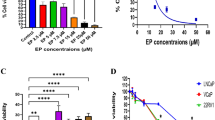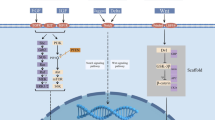Abstract
Purpose
Androgen-independent prostate cancer (AI-PC) is characterized by a higher invasive potential compared to hormone-responsive prostate cancer. A therapeutic option for AI-PC should thus be targeted to suppress not only cell proliferation, but also the invasive ability of the cells. Here, we investigated the effect of the epidermal growth factor receptor (EGFR) tyrosine kinase inhibitor gefitinib (‘IRESSA’, ZD1839) on EGF-stimulated invasion and proliferation in two androgen-independent prostate cancer cell lines PC3 and DU145. In addition, we determined the effect of the compound on EGF-stimulated PI3 K/AKT pathway activation, in view of the key role exerted by this pathway in carcinoma cell invasion.
Methods
Cell proliferation was determined by thymidine incorporation in the nuclei. Cell cycle analysis was performed by flow cytometry. Invasion through matrigel in vitro was measured by using Boyden chambers. PI3 K activity was measured by immunokinase assay and AKT phosphorylation was evaluated by Western blot analysis.
Results
Gefitinib inhibits invasion through matrigel and collagen in response to EGF in both cell lines. In addition, we confirm the inhibitory effect of the compound on basal and EGF-induced cell proliferation. Such an effect was accompanied by accumulation of the cells in the G0/G1 phase of the cell cycle. The effect of the compound is due, as expected, to suppression of EGF-induced autotransphosphorylation of EGFR. In addition, we demonstrate here that gefitinib inhibits EGF-induced activation of PI3 K/AKT pathway in both cell lines.
Conclusion
Overall, our results demonstrate that gefitinib is able to suppress invasion and proliferation of AI-PC cells by suppressing EGF-stimulated activation of the PI3 K/AKT pathway and support a possible use of the drug in the treatment of advanced PC to limit not only proliferation but also invasion to other districts.






Similar content being viewed by others
Abbreviations
- EGF:
-
Epidermal growth factor
- EGFR:
-
Epidermal growth factor receptor
- AI-PC:
-
Androgen-independent prostate cancer
- PI3 K:
-
Phosphatidylinositol 3-kinase
References
Albanell J, Rojo F, Averbuch S, Feyereislova A, Mascaro JM, Herbst R, LoRusso P, Rischin D, Sauleda S, Gee J, Nicholson RI, Baselga J (2002) Pharmacodynamic studies of the epidermal growth factor receptor inhibitor ZD1839 in skin from cancer patients: istopathologic and molecular consequences of receptor inhibition. J Clin Oncol 20:110–124
Albini A, Iwamoto Y, Kleinman HK, Martin GR, Aaronson S A, Kozlowski JM, McEwan RN (1987) A rapid in vitro assay for quantitating the invasive potential of tumor cells. Cancer Res 47:3239–3245
Baldi E, Bonaccorsi L, Forti G (2003) Androgen receptor: good guy or bad guy in prostate cancer invasion? Endocrinology 144:1653–1655
Bastola DR, Pahwa GS, Lin MF, Cheng PW (2002) Downregulation of PTEN/MMAC/TEP1 expression in human prostate cancer cell line DU145 by growth stimuli. Mol Cell Biochem 236:75–81
Bianco R, Shin I, Ritter CA, Yakes FM, Basso A, Rosen N, Tsurutani J, Dennis PA, Mills GB, Arteaga CL (2003) Loss of PTEN/MMAC1/TEP in EGF receptor-expressing tumor cells counteracts the antitumor action of EGFR tyrosine kinase inhibitors. Oncogene 22:2812–2822
Blackledge G, Averbuch S, Kay A, Barton J (2000) Anti-EGF receptor therapy. Prostate Cancer Prostatic Dis 3:296–302
Bonaccorsi L, Luconi M, Maggi M, Muratori M, Forti G, Serio M, Baldi E (1997) Protein tyrosine kinase, mitogen-activated protein kinase and protein kinase C are involved in the mitogenic signaling of platelet-activating factor (PAF) in HEC-1A cells. Biochim Biophys Acta 1355:155–166
Bonaccorsi L, Carloni V, Muratori M, Salvatori A, Giannini A, Carini M, Serio M, Forti G, Baldi E (2000) Androgen receptor expression in prostate carcinoma cells suppresses alpha6beta4 integrin-mediated invasive phenotype. Endocrinology 141:3172–3182
Cantley LC (2002) The phosphoinositide 3-kinase pathway. Science 296:1655–1657
Chen X, Thakkar H, Tyan F, Gim S, Robinson H, Lee C, Pandey SK, Nwokorie C, Onwudiwe N, Srivastava RK (2001) Constitutively active Akt is an important regulator of TRAIL sensitivity in prostate cancer. Oncogene 20:6073–6083
Cinar B, Koeneman KS, Edlund M, Prins GS, Zhau HE, Chung LW (2001) Androgen receptor mediates the reduced tumor growth, enhanced androgen responsiveness, and selected target gene transactivation in a human prostate cancer cell line. Cancer Res 61:7310–7317
Di Lorenzo G, Tortora G, D’Armiento FP, De Rosa G, Staibano S, Autorino R, D’Armiento M, De Laurentiis M, De Placido S, Catalano G, Bianco AR, Ciardiello F (2002) Expression of epidermal growth factor receptor correlates with disease relapse and progression to androgen-independence in human prostate cancer. Clin Cancer Res 8:3438–3444
Grille SJ, Bellicosa A, Upson J, Klein-Szanto AJ, van Roy F, Lee-Kwon W, Donowitz M, Tsichlis PN, Larue L (2003) The protein kinase Akt induces epithelial mesenchymal transition and promotes enhanced motility and invasiveness of squamous cell carcinoma lines. Cancer Res 63:2172–2178
Grönberg H (2003) Prostate cancer epidemiology. Lancet 361:859–864
Hofer DR, Sherwood ER, Bromberg WD, Mendelsohn J, Lee C, Kozlowski JM (1991) Autonomous growth of androgen-independent human prostatic carcinoma cells: role of transforming growth factor alpha. Cancer Res 51:2780–2785
Huang H, Cheville JC, Pan Y, Roche PC, Schmidt LJ, Tindall DJ (2001) PTEN induces chemosensitivity in PTEN-mutated prostate cancer cells by suppression of Bcl-2 expression. J Biol Chem 276:38830–38836
Huang S-M, Jing L, Armstrong EA, Harari PM (2002) Modulation of radiation response and tumor-induced angiogenesis after epidermal groath factor receptor inhibition by ZD1839 (Iressa). Cancer Res 62:4300–4306
Luconi M, Carloni V, Marra F, Ferruzzi P, Forti G, Baldi E (2004) Increased phosphorylation of AKAP by inhibition of phosphatidylinositol 3-kinase enhances human sperm motility through tail recruitment of protein kinase A. Journal Cell Sci 117:1235–1246
Maggi M, Bonaccorsi L, Finetti G, Carloni V, Muratori M, Laffi G, Forti G, Serio M, Baldi E (1994) Platelet-activating factor mediates an autocrine proliferative loop in the endometrial adenocarcinoma cell line HEC-1A. Cancer Res 54:4777–4784
Mareel M, Leroy A (2003) Clinical, cellular, and molecular aspects of cancer invasion. Physiol Rev 83:337–376
Mimeault M, Pommery N, Henichart JP (2003) New advances on prostate carcinogenesis and therapies: involvement of EGF-EGFR transduction system. Growth Factors 21:1–14
Muratori M, Nicoletti I, Vannelli GB, Luconi M, Macorsini E, Serio M, Forti G, Maggi M (1997) Genistein induces a G(2)/M block and apoptosis in human uterine adenocarcinoma cell lines. Endocr Relat Cancer 4:203–218
Muratori M, Piomboni P, Baldi E, Filimberti E, Pecchioli P, Moretti E, Gambera L, Baccetti B, Biagiotti R, Forti G, Maggi M (2000) Functional and ultrastructural features of DNA-fragmented human sperm. J Androl 21:903–912
Normanno N, Bianco C, De Luca A, Maiello MR, Salomon DS (2003) Target-based agents against ErbB receptors and their ligands: a novel approach to cancer treatment. Endocr Relat Cancer 10:1–21
Peng D, Fan Z, Lu Y, DeBlasio T, Scher H, Mendelsohn J (1996) Anti-epidermal growth factor receptor monoclonal antibody 225 up-regulates p27KIP1 and induces G1 arrest in prostatic cancer cell line DU145. Cancer Res 56:3666–3669
Rabinovitz I, Toker A, Mercurio AM (1999) Protein kinase C-dependent mobilization of the alpha6beta4 integrin from hemidesmosomes and its association with actin-rich cell protrusions drive the chemotactic migration of carcinoma cells. J Cell Biol 146:1147–1160
Rodrigues S, Attoub S, Nguyen QD, Bruyneel E, Rodrigue CM, Westley BR, May FE, Thim L, Mareel M, Emami S, Gespach C (2003) Selective abrogation of the proinvasive activity of the trefoil peptides pS2 and spasmolytic polypeptide by disruption of the EGF receptor signaling pathwaysin kidney and colonic cancer cells. Oncogene 22:4488–4497
Russell PJ, Bennett S, Stricker P (1998) Growth factor involvement in progression of prostate cancer. Clin Chem 44:705–723
Scher HI, Sarkis A, Reuter V, Cohen D, Netto G, Petrylak D, Lianes P, Fuks Z, Mendelsohn J, Cordon-Cardo C (1995) Changing pattern of expression of the epidermal growth factor receptor and transforming growth factor alpha in the progression of prostatic neoplasms. Clin Cancer Res 1:545–550
Sirotnak FM, She Y, Lee F, Chen J, Scher HI (2002) Studies with CWR22 xenografts in nude mice suggest that gefitinib may have a role in the treatment of both androgen-dependent and androgen-independent human prostate cancer. Clin Cancer Res 8:3870–3876
Sotsios Y, Ward SG (2000) Phosphoinositide 3-kinase: a key biochemical signal for cell migration in response to chemokines. Immunol Res 177:217–235
Vicentini C, Festuccia C, Gravina GL, Angelucci A, Marronaro A, Bologna M (2003) Prostate cancer cell proliferation is strongly reduced by the epidermal growth factor receptor tyrosine kinase inhibitor ZD1839 in vitro on human cell lines and primary cultures. J Cancer Res Clin Oncol 129:165–174
Wells A, Kassis J, Solava J, Turner T, Lauffenburger DA (2002) Growth factor-induced cell motility in tumor invasion. Acta Oncol 41:124–130
Zi X, Singh RP, Agarwal R (2000) Impairment of erbB1 receptor and fluid-phase endocytosis and associated mitogenic signaling by inositol hexaphosphate in human prostate carcinoma DU145 cells. Carcinogenesis 21:2225–2235
Acknowledgements
We thank Prof. Mario Maggi (Endocrine Unit, University of Florence) and Dr. Clara Crescioli (Endocrine Unit, University of Florence) for helpful advice. Supported by Associazione Italiana Ricerca sul Cancro (AIRC, Milan), University of Florence, Ministry of University and Scientific Research (Programmi di Ricerca Scientifica di Rilevante Interesse Nazionale, COFIN), and AstraZeneca Spa (Basiglio, Milan, Italy).
Author information
Authors and Affiliations
Corresponding author
Rights and permissions
About this article
Cite this article
Bonaccorsi, L., Marchiani, S., Muratori, M. et al. Gefitinib (‘IRESSA’, ZD1839) inhibits EGF-induced invasion in prostate cancer cells by suppressing PI3 K/AKT activation. J Cancer Res Clin Oncol 130, 604–614 (2004). https://doi.org/10.1007/s00432-004-0581-8
Received:
Accepted:
Published:
Issue Date:
DOI: https://doi.org/10.1007/s00432-004-0581-8




